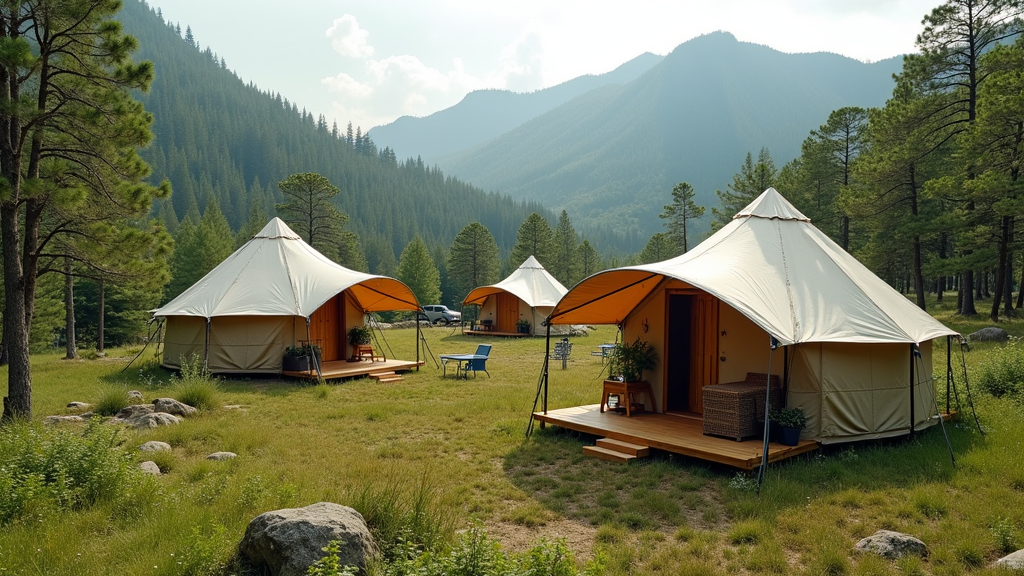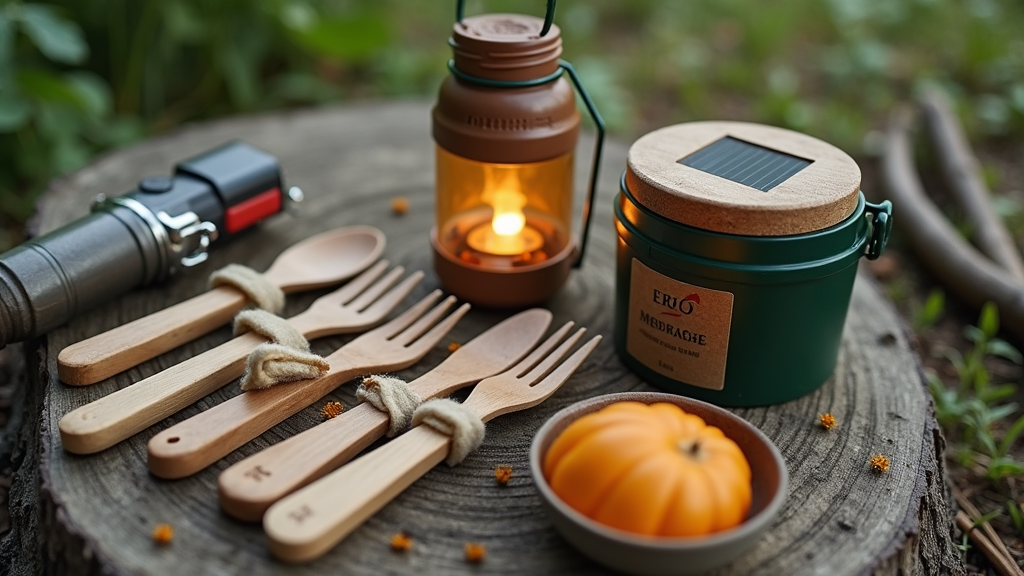Eco-friendly camping is all about enjoying the great outdoors while keeping nature clean and beautiful. Many people are choosing sustainable camping practices as a way to reduce their impact and enjoy a more natural experience. In this article, I share a variety of camping hacks that help make your trips eco-friendly, reduce waste, and support sustainable practices. Whether you’re new to camping or have years of experience, these ideas can add a fresh twist to your outdoor adventures.

Essential Gear for Sustainable Camping
Sustainable camping starts with choosing the right gear. Using eco-friendly materials not only preserves the environment but also adds comfort and convenience to your camping trips. These days, there are many options that allow you to reduce waste and use renewable energy sources. For instance, solar-powered lanterns, reusable cooking utensils, and biodegradable tents can significantly lower the overall footprint of your adventure.
When you invest in eco-friendly equipment, you not only take care of nature but you also set up a comfortable base for your outing. Many of these products are designed using recycled and natural materials. This means that even when your gear does eventually wear out, it can often be recycled or will naturally degrade without harming the environment.
There are a few types of gear that I find especially useful on eco-camping trips:
- Sustainable Tents: Tents made of recycled fabrics and biodegradable materials offer protection while minimizing environmental impact.
- Solar-Powered Gadgets: Items like solar lanterns and chargers help power your devices without needing disposable batteries.
- Reusable Tools: From cooking utensils to water bottles, the use of long-lasting, wash-friendly items reduces waste significantly.
Getting Started with Eco-friendly Camping
Kick things off on an eco-friendly camping trip might feel overwhelming at first, especially if sustainability is new to you. However, a few simple guidelines can help you get started on the right track. First, consider planning your trip around natural resources. Think about using local and sustainable supplies and even incorporating a portion of your budget to support local eco-friendly businesses.
Here are some useful steps to guide you as you transition to eco-friendly camping:
- Plan with Nature in Mind: Choose locations that have established eco-friendly practices or those that encourage a “leave no trace” policy.
- Use Renewable Energy Sources: Bring along solar-powered chargers and lanterns to avoid reliance on disposable batteries.
- Opt for Reusable and Recyclable Gear: Use products that can be easily washed, reused, or recycled to minimize waste.
- Embrace Minimalism: Pack only what you need. Extra items often lead to unnecessary waste.
- Educate Yourself: Understand the land and local regulations. Many campsites now have strict guidelines to protect the environment.
By following these straightforward steps, you can not only have an enjoyable camping trip but also help reduce your environmental impact.
Considerations for a Sustainable Camping Experience
Even the best-laid plans can face challenges during a camping trip. Here, I discuss some common hurdles that can arise and offer ideas to overcome them. One of the bigger issues is managing energy efficiently, especially when it comes to powering essential equipment while off the grid. Solar chargers and portable power banks are great, but their capability depends on the weather and the duration of your trip.
A few other smart tips include:
- Energy Management: Use solar panels whenever possible and plan your energy use around sunrise and sunset. If you plan to use lights and devices, invest in solar batteries to store extra charge for cloudy days.
- Water Conservation: Learn about water recycling options and bring reusable water containers. Setting up a simple filtration system can also turn nearby water sources into a reliable supply for your trip.
- Waste Reduction: Pack out what you pack in. Use biodegradable bags for any waste and try to compost organic materials if possible.
- Environment-Friendly Cooking: Use portable stoves that burn clean fuel or, even better, rely on solar ovens when weather permits.
Energy Management
A common challenge during extended camping trips is relying on battery power. Traditional battery usage can add to waste and require frequent replacements. Switching to solar-powered options can help you maintain essential energy needs while staying aligned with sustainable practices. Solar panels can recharge devices in sunlight, allowing you to store and later use energy during the night or on cloudy days.
Water Conservation
Water is a precious resource when camping, and being mindful about its use is very important. Carrying a lightweight water filter can allow you to use natural water sources safely. Additionally, try to minimize your water waste by using biodegradable soaps and cutting down on excessive washing. Simple innovations like carrying a collapsible water container can be very handy.
Waste Reduction
Leaving a campsite without a trace involves managing both solid and liquid waste properly. I always bring along a small set of biodegradable bags and a portable trash container. This habit not only keeps campsites pristine but also sets a positive example for other campers who might see and adopt similar practices.
Environment-Friendly Cooking
Cooking in the wild does not have to harm nature. Using clean-burning stoves and sustainable fuels such as wood chips or charcoal alternatives minimizes the release of pollutants. There are also lightweight, portable cooking devices designed to use minimal energy. It’s all about tapping into energy in a way that reduces your carbon footprint while still letting you enjoy a warm meal under the stars.
These considerations may require a bit of extra planning, but the benefits of reducing your footprint and preserving nature far outweigh the minor inconveniences.
Keeping these challenges and suggestions in mind will help ensure that your next camping adventure remains both enjoyable and sustainable.
Advanced Eco-friendly Camping Hacks
Once you have the basics down, there are several creative strategies to really boost your eco-friendly camping experience. Here, I share some advanced hacks that make camping not only more sustainable but also more enjoyable.
Integrate Renewable Energy Sources: Consider investing in mini solar panels that can be hooked up to your devices or even your camp lights. These panels are compact, easy to carry, and can be set up in a few minutes to continuously charge your accessories during the day.
Modular Packaging for Food Storage: Use reusable containers for storing food and leftovers. The packaging should be easy to clean and pack, and ideally, made from materials like stainless steel or recycled plastics. This small change significantly cuts down on disposable waste.
Natural Insulation Hacks: During colder nights, consider lining your sleeping area with extra natural materials like dry leaves or pine boughs, which are often easily available at the campsite. These natural insulators are biodegradable and provide a cozy, warm layer without the energy cost of heating devices.
Smart Waste Management: Bring along a compact compost bin. Over several days, you might gather food scraps and biodegradable waste that could be processed into compost. Not only does this reduce landfill waste, but you can also use the compost for gardening when you return home.
Eco-friendly Hygiene: Switching to biodegradable soap and shampoo ensures that when you rinse off, harmful chemicals are not introduced into the waterways. Pack these items in reusable containers that can be refilled for future trips.
These advanced hacks let you push your sustainability efforts one notch higher. Experimenting with renewable energy, modular storage, natural insulation, waste composting, and green hygiene practices creates a richer, more environmentally conscious camping experience.
The Basics: What Campers Should Focus On
While advanced tactics can refine your eco-friendly practices, starting with the fundamentals is equally important. Understanding what gear and approaches work best for beginners can help you build a strong foundation for sustainable camping.
Basic equipment and practices that come in handy include:
- Biodegradable Tents and Sleeping Bags: Look for products that use natural fibers and eco-friendly processing methods. These materials are designed to break down more easily over time without harming the environment.
- Reusable Kitchenware: Pack items like metal or bamboo plates, bowls, and utensils. These are durable and reduce the need for disposable plastics.
- Eco-friendly Lighting: Instead of gas-powered lanterns, opt for solar or LED lights that use less energy and have a longer lifespan.
- Efficient Cooking Equipment: Items such as compact wood stoves or solar ovens can reduce fuel consumption and lower overall emissions.
Alongside equipment, a mindset shift toward minimalism and conservation makes a world of difference. Reducing excess, planning meticulously, and maintaining a strong awareness of natural surroundings are habits that will serve you well on repeated trips.
This foundation not only makes your trips more sustainable but also enriches the quality of your camping experience. The simple steps you take—from choosing the right gear to planning your energy usage—work together to reduce your overall environmental impact.
Frequently Asked Questions

Eco-friendly camping can bring up many questions. Below are some common queries and ideas that might help you get started on your journey toward sustainable adventures.
Question: What are eco-friendly camping hacks all about?
Answer: It involves using renewable resources, reducing waste, and choosing sustainable products that minimize environmental impact. This means everything from solar-powered gear to biodegradable utensils.
Question: How can I power my devices off the grid without harming the environment?
Answer: Solar panels and portable solar chargers are a great option. They allow you to harness renewable energy during the day, ensuring your devices remain charged without relying on disposable batteries.
Question: What measures can I take to minimize waste during my camping trip?
Answer: Focus on reusable items such as cookery, water bottles, and recycling bins. Bringing along a small compost container for organic waste and using biodegradable cleaning products also helps reduce waste.
Question: Are there any simple hacks to deal with colder nights naturally?
Answer: Yes, layering natural insulators like dry leaves or pine boughs beneath your sleeping bag can naturally trap heat. Additionally, using an eco-friendly, insulated tent helps maintain warmth without extra energy use.
Extra Considerations for the Thoughtful Camper
For many, the idea of sustainable camping goes beyond just picking the right gear and planning for renewable energy. It also involves a mindful approach to every action taken in the wild. Careful waste management, respecting local wildlife, and engaging with community initiatives are all parts of an all-in-one camping experience. Spending a few extra moments planning how you interact with nature can truly make a difference. Whether you are setting up a camp, preparing your meals with minimal resources, or simply resting under the open sky, each action reflects your commitment to preserving the ecosystem for generations to come.
Another important aspect is safety and preparedness. When camping in remote areas, it is very important to have a clear understanding of the local environment. Make sure you check in with local guides or rangers to get a feel for the area, including weather forecasts and any wildlife activity. Carrying a first aid kit, extra food supplies, and a reliable communication device can help you stay safe. These extra measures not only protect you during your adventure but also help in building a respectful connection to the land and its challenges.
Moreover, consider leaving behind more than just footprints. Engage with local communities by supporting eco-friendly initiatives or even volunteering a bit of your time. Small actions, such as planting trees or helping clean up a nearby waterway, can have a lasting impact and inspire others to follow suit. These proactive steps emphasize that sustainable camping is about more than just personal enjoyment—it’s about contributing meaningfully to the health of our planet.
Wrapping Up
Eco-friendly camping is a rewarding way to enjoy nature while preserving it for future generations. Adopting sustainable practices, choosing renewable energy solutions, and using green gear transforms a simple camping trip into a conscious effort toward environmental conservation. Whether you are a seasoned camper or a beginner, the hacks and tips in this article are designed to give a boost to your outdoor experience. By planning thoughtfully and using eco-friendly products, your campfires, cooking, and nighttime routines can all contribute to a healthier environment. Enjoy the peace of nature. Make smart choices. Every trip is a step toward a more sustainable future for our planet.
Happy camping, and may your adventures be as kind to the earth as they are fun!
